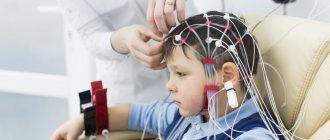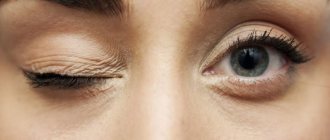Sometimes children in class have no time to study at all, and on the street they have no time to go for a walk. They may look wild, tense, dissatisfied, extremely slow, unable to put together two words in simple situations. Additional flavor to the painting entitled “Failure in Bloom” can be added by bitten nails, scratched hands and other signs of releasing accumulated tension. Sometimes even an intelligent parent, after a certain number of well-conducted conversations, loses his nerve and bursts out: “What kind of person are you? How can? All people are like people, and you...” But we want to warn you against unfair reproaches. The children are in a difficult situation! 50% of people suffer from neuroses at different periods of their lives, and often these neuroses debut in adolescence.
What is a nervous breakdown and what can cause it?
Irina Tishkevich
Medical psychologist, Gestalt therapist
– The concept of “nervous breakdown” as such does not exist in the scientific literature. It is rather an abstract designation for a number of mental states. In my practice, this was the name for crying out loud and gushing rage with the destruction of all things in the apartment in a state of psychosis.
But most often, “nervous breakdown” refers to a neurotic spectrum of experiences. Some sources, for example, define it as "an acute, temporary, reactive disorder with symptoms of neurosis and depression ." Others include symptoms of post-traumatic stress disorder .
Most often, the causes may be severe or prolonged stressful events. Moreover, the same situation can cause different reactions in different people. For some, difficulties in a new job are an interesting challenge or adventure. And for some it is a serious test. And it’s not just about the team or the boss, but also about the adaptive abilities and stress resistance of the person himself, including his personal qualities, experience, age, physical and psycho-emotional state at the time of the event, and the presence of social support.
Are there “risk groups” who are more at risk of a nervous breakdown than others?
– In a sense, many of us are familiar or will one day become familiar with this condition in a mild form (in its neurotic interpretation), since life is not an easy thing, and we people are not made of iron.
But some are truly more vulnerable due to the innate sensitivity of the nervous system, weak self-regulation capabilities, lack of mature defenses, and traumatic experiences in early childhood. For example, a person who grew up left to his own devices with alcoholic parents will be more sensitive to stress than someone who comes from a prosperous family.
It is impossible to provide statistics on nervous breakdowns: this concept is not used in research. But, if we equate it with registered neurotic spectrum disorders, we can see their prevalence from 10 to 20% among the urban population , according to WHO.
The real figure is much, much higher than official statistics: most people either cope with such conditions on their own, or simply do not have the opportunity to seek help.
How to define neurosis
Symptoms depend on the form of neurosis. The most common manifestations of the body and psyche are:
- sleep disorders;
- indigestion;
- breathing problems, feeling of suffocation;
- disruption of the heart and blood vessels;
- vegetative symptoms - trembling, convulsions, sweating, temperature changes, even pain.
One of the first possible signals is sleep disturbances. Difficulty falling asleep, shallow or restless sleep, frequent awakenings. The feeling of tension in the head during neurosis is a consequence of the fact that at night the nervous system is not fully restored. Sleep disorders lead to constant tension and emotional breakdowns.
The digestive system is sensitive to psychological traumatic factors. She reacts with loss of appetite, flatulence, frequent pain and discomfort in the abdomen, and problems with stool. In this case, the person has neither an ulcer nor an intestinal infection. A common manifestation is nausea during neurosis, which is accompanied by a feeling of dry mouth.
Important
The nervous system is connected to all internal organs, so with neurosis the entire body suffers. The opposite is also true: if you give a specialist the opportunity to cure the psyche, the physical symptoms will also disappear.
With neuroses, there are breathing problems: typical complaints are lack of air, difficulty inhaling or exhaling, and suffocation. Sometimes a person feels like he has forgotten how to breathe. It is often observed when you find yourself in a conflict or emotionally significant situation.
From the cardiovascular system, hypertensive crises, heart rhythm disturbances, and discomfort in the chest area may be observed. Tachycardia with neurosis is a common complaint.
The nervous system takes the main “blow” under constant stress. A person experiences tremors in the body during neurosis, frequent headaches, hot flashes, muscle cramps, changes in sensitivity (numbness of the limbs). Sometimes he may complain that he feels dizzy for no reason.
All changes in neurosis are functional, that is, reversible. With adequate treatment, patients recover completely.
Mentally, a person becomes depressed, cannot concentrate for a long time, and memory decreases. The level of anxiety increases, and overly violent emotional reactions are possible. With psychoneuroses, there are no hallucinations, but sometimes there is tinnitus.
If it is necessary to sit quietly for some time, a person with neurosis experiences discomfort. To calm himself down, he begins to tap his pen, play with an item of clothing, and fidget with his fingers.
How can I tell if I'm having a nervous breakdown?
– Various sources include the following symptoms as neurotic manifestations of a “nervous breakdown”:
- increased emotional sensitivity, which was not there before, irritability, anxiety;
- feeling of helplessness, hopelessness, feeling small, weak, defective, wounded, bad;
- craving for a state of “oblivion” (you want to get drunk, fall asleep, “disconnect from life”);
- impulsive suicidal thoughts, acute desire to harm oneself;
- insomnia or, conversely, excessive drowsiness;
- complaints of cognitive failure (when it’s hard to think, remember, impossible to concentrate);
- a state of acute anxiety, panic, constant rapid heartbeat or frequent increase in heart rate;
- loss of interest in everyday activities, work, friends, hobbies, clothes, etc.;
- decreased or loss of sexual desire;
- loss of sense of humor;
- nervous and physical exhaustion, noticeable weight loss or gain;
- physical ailments, signs of decreased immunity,
- marked deterioration in social functioning, need for isolation;
- other individual reactions that were not there before with their negative subjective assessment.
Can you predict that I'm about to have a nervous breakdown? Or could it happen suddenly?
– I always encourage people to be aware of their condition. After all, then they can quickly understand what is happening to them and react more adequately, helping themselves to avoid unfolding painful dynamics.
Metaphorically, if I can clearly see the terrain under my feet and check the map, I can navigate it more safely and get to the desired point. In such a situation, I don’t need to predict; I need to make adequate and timely decisions. If by “prediction” we mean recognition, then we check the symptoms described above.
Sometimes a nervous breakdown may feel “sudden”, but it is always preceded by some external and reciprocal internal event or even a series of events. It’s just that a person might not realize it and not think about it. Some of the experiences were hidden from his consciousness and processed on a subconscious level, and when it became impossible to ignore or repress the information, obvious mental or physical phenomena appeared.
One of my patients cared for her bedridden mother-in-law for a very long time and with great difficulty. She was very tired and could not share it with anyone else until she eventually came down with depression herself.
It turns out that a nervous breakdown can lead to more serious consequences - for example, depression?
– Yes, most of the symptoms described above are a description of a depressive state. But usually the diagnosis of depression is made after two weeks with a clear decrease in mood (although there are exceptions when a person experiences depression rather “bodily”, without a conscious decrease in mood).
Therefore, if you do not pay attention to unpleasant signs in time and do not begin to work through them at the level of thinking, emotions and behavior, your mental state can really worsen.
Can a nervous breakdown be chronic?
– From the very definition of a nervous breakdown it is clear that this is a rather acute and temporary reaction. If a person fails to slow down the progression of the disorder, then it continues to deepen in a specific individual direction, depending on the characteristics of the individual and the functioning of the psyche.
As a result, even after successful treatment, there may be relapses of disorders, for example, after another distress (distress is a negative form of stress; the positive form is called eustress - Ed.). But everything is individual.
Nervous exhaustion – a modern disease?
Neurasthenia - nervous exhaustion
– in my opinion, the most common disease today.
And the least diagnosed. It disguises itself as depression, bad character, laziness, as well as a whole bunch of somatic diseases. So it turns out that a person is being treated for depression, headaches, vegetative-vascular dystonia, abdominal pain, stomach ulcers, but neurasthenia - the cause of the illness - does not go away. What symptoms can be used to suspect nervous exhaustion?
Signs of neurasthenia
1. Irritability
– a person becomes hot-tempered, starts up at half a turn. Literally everything irritates – even close people, music that you previously liked, your own habits... This irritation flares up immediately and completely covers the person...
2. Impatience
- all ability to wait, to restrain oneself is lost... For example, even knowing that the bus will arrive in 5 minutes, a patient with neurasthenia will not wait for it and will go on foot.
3. Fatigue
– despite the violent manifestations of feelings, a patient with neurasthenia quickly gets tired. In general, fatigue constantly haunts a neurasthenic - in the morning, waking up, he already feels tired.
4. Weakness
– it seems that the arms and legs are like strings, and any movement requires effort.
5. Headache
– they are very common with neurasthenia, occur at the slightest load, and have a compressive nature. Typical sensations are as if a helmet is squeezing the head, or pain behind the eyes and in the temples.
6. Brain fog
– everything is perceived as if through a veil, the head seems to be filled with cotton, intellectual activity becomes unproductive. Often my head is a mess of unpleasant thoughts that interrupt each other...
7. Inability to concentrate - everything distracts
. When trying to engage in intellectual activity, the patient quickly switches to something else: for example, he begins to walk from room to room, look for some objects, then make tea...
It is common for modern office workers to be distracted in such cases by communicating on ASI, Skype, and it is pointless to spend time on social networks (VKontakte, Odnoklassniki)…
8. Increased sensitivity
– even quiet sounds seem unpleasantly loud, the light seems bright... Banal melodrama can cause tears.
9. Sleep disturbance
– it is very difficult to fall asleep – despite the feeling of fatigue and the desire to fall asleep, unpleasant thoughts wander through your head like cockroaches... Such sleepless torment can last for hours... The ensuing sleep is superficial, filled with disturbing, unpleasant dreams. Upon awakening, a person feels completely overwhelmed and tired.
10. Anxiety, fears
– the soul is tormented by various fears, doubts, anxiety at the slightest reason.
11. Low self-esteem
- a person perceives himself as a loser, a nonentity, a weak personality... Often he finds himself with a lot of physical diseases and endlessly undergoes examinations from general practitioners.
12. Decreased sexual desire
– men often experience premature ejaculation, and later impotence.
13. Exacerbation of chronic diseases and the emergence of psychosomatic disorders
– pain in the spine, a feeling of tightness in the chest, heaviness in the heart, tremors, psoriasis, allergies, conjunctivitis, herpes, acne, joint pain, eye pain and visual disturbances, problems with teeth, nails, hair, sudden weight loss...
As you can see, the manifestations of neurasthenia, on the one hand, are serious, on the other hand, they are varied and non-specific, which makes it possible for neurasthenia to masquerade as many diseases. Depending on the degree of neurasthenia, there are three stages.
Course of neurasthenia
The first stage is hypersthenic
.
A person becomes irritable, fussy, and cannot sit in one place for a long time. He is aware of these changes, but cannot help himself. If he loses control of himself, he starts screaming. Often, holding back at work, coming home, he begins to quarrel “for no reason” with loved ones. Difficulty concentrating. Unsuccessful attempts to collect yourself and reduced productivity cause even more irritation. Sleeping is disrupted, the person lies awake in bed for a long time. Pressing headaches, pain in the spine, weakness, and a constant feeling of fatigue appear.
The second stage is “irritable weakness.”
Literally everything is irritating; the patient flares up very quickly, but it doesn’t last long. The ability to concentrate is lost, the patient is practically unable to do work, and is constantly distracted. Fears appear and anxiety increases. The patient becomes convinced that he is incapable of anything, that he is a failure, that his life has been lived in vain. Any sounds, bright lights, or smells are irritating. Moving people and crowds are annoying. Nothing brings pleasure. Sleep is disturbed: it is superficial and does not give rest. Headaches are constant. There may be pain in the heart, shortness of breath, a feeling of lack of air, abdominal pain, diarrhea and constipation, allergies, a feeling of weakness and pain in the muscles, dizziness, sometimes breaking into a sweat...
The third stage is hyposthenic.
At this stage, fussiness and unproductive activity decreases. The patient simply does not want to do anything. Sad mood, complaints of multiple bodily ailments. Superficial sleep. Everything is annoying. Sometimes fear of the future, fear of death, and tearfulness appear. The condition is very similar to depression.
Causes of neurasthenia
The main cause of neurasthenia is overwork. Both physical and emotional fatigue play a role. Moreover, normal physical activity will never cause depression - moreover, it can cure depression. But physical inactivity, long periods of work at the computer, and lack of fresh air can very quickly cause neurasthenia. Particularly harmful is mental activity associated with the need to focus on something for a long time, wait for something, perform homogeneous, boring work that requires attention - the work of an operator, proofreader, programmer... Stress and the presence of irritating factors at work and at home play a very important role , long working hours, lack of sleep. Health is undermined by intoxication, infections, smoking, alcohol, and lack of vitamins. Particularly harmful is the state of anticipation of some kind of misfortune, vigilance - such a mood very often causes neurasthenia.
The insidiousness of neurasthenia
Neurasthenia always begins unnoticed, like simple fatigue or malaise, and it seems that such nonsense is not worth seeing a doctor - it will go away on its own. However, the essence of neurasthenia is such that it takes away the opportunity for self-healing - after all, the only correct method of curing neurasthenia is rest, and it is precisely this that is not possible in the state of a neurasthenic - first of all, sleep is disturbed, restlessness, irritability, and anxiety appear. It turns out that the neurasthenic runs in a vicious circle - lack of rest and relaxation causes neurasthenia, neurasthenia causes the inability to rest and relax. Another danger is self-medication - incorrect prescription of drugs that nourish and stimulate the nervous system only increases irritability, headaches, insomnia and further depletes the nervous system.
Neurasthenia masks
Those suffering from neurasthenia, due to the special variety of complaints, rarely turn to a psychiatrist or psychotherapist, more often going to other specialists, at best to a neurologist, more often to a therapist, or even to a psychologist. It is clear that each specialist sees primarily “their own” complaints, therefore the diagnoses are extremely diverse. A neurologist is the only non-psychiatric specialist who can call neurasthenia neurasthenia and select the correct drug treatment. However, the cause of neurasthenia often lies in psychological problems, and here the neurologist is powerless - he is not trained in psychotherapy. In addition to the diagnosis of neurasthenia, neurologists often diagnose vegetative-vascular dystonia, dyscirculatory disorders of the brain, and vegetative-vascular insufficiency. The therapist can make a “mythical” diagnosis of “Chronic Fatigue Syndrome”, and also find in the patient cardiovascular failure, functional digestive disorders, weak immunity, chronic gastritis, biliary dyskinesia, low hemoglobin, and dysbacteriosis. Recently, it has become fashionable to find parasites and chronic infections such as mononucleosis and herpes.
Yes, indeed, with neurasthenia, immunity and hemoglobin decrease, chronic diseases worsen - but these diseases are not the causes of neurasthenia - remove neurasthenia - and the body will recover by itself!
The ophthalmologist finds a spasm of accommodation (it is very common with neurasthenia, especially in mouse and keyboard workers). The dermatologist finds neurodermatitis, herpes, psoriasis. An orthopedist, massage therapist, or chiropractor find osteochondrosis, usually of the cervical spine, and begin to treat it. A psychologist sees depression, complexes, stress, and tells you about them. Most often, this makes it worse - after all, with neurasthenia there is not enough mental energy to work on oneself! The grandmother finds the evil eye or damage, and “skillfully” rolls it out with an egg. Or it tingles. This makes neurasthenia neither warm nor cold. A psychic and bioenergetics person sees a large hole in the aura. The hole needs to be mended. Neurasthenia remains.
Indeed, with neurasthenia, all organs and systems of the body are affected, and every specialist is right in finding something different - but all these are consequences of primary nervous exhaustion. Therefore, only a psychotherapist (psychiatrist) is able to treat both the cause and consequences of neurasthenia, seeing this disease as a whole.
Treatment of neurasthenia
Mode
. Treatment of neurasthenia begins with the correct choice of daily routine, time for sleep, work, and walks. Working conditions are carefully studied and shortcomings are corrected. The regime involves spending a long time in the fresh air.
Non-drug normalization of sleep
. The patient is taught some techniques to help normalize sleep: relaxation methods, special, individually developed rules to help normalize sleep - a sample of such rules is given below: • Go to bed only when very tired. • Do not do extraneous activities in bed - do not read, do not eat, do not work on a laptop, do not watch TV. • If you can't sleep, don't lie in bed - get up and do something! • Get up at the same time every morning.
Rest
. Special techniques are being developed to help you rest most effectively.
Physical exercise
. One of the causes of neurasthenia is physical inactivity, so physical activity plays an important role in the treatment of neurasthenia. However, it must be strictly dosed - after all, neurasthenia is a disease of exhaustion, and an incorrectly chosen load will worsen the situation. You should start with long walks in the fresh air; swimming gives good results; as your body strengthens, you can move on to more active activities.
Diet
. A properly designed diet for neurasthenia contains foods that increase the body’s adaptive capabilities and help quickly recover. Much attention is paid to the frequency and regularity of food intake.
Water treatments
. For neurasthenia, swimming and warm baths containing decoctions of certain herbs are useful.
Hypnosleep, hypnorest
. Hypnosis promotes deep relaxation and sleep, which is so necessary for neurasthenia. It very effectively relieves overexcitement and nervous tension, relieves fears, anxieties, and obsessive thoughts. One hour of hypnosis can replace many hours of sleep. During hypnosis, it is possible to achieve very deep relaxation, which is usually impossible during natural sleep - after all, in neurasthenics it is superficial. Hypnosis can activate all the forces to cure the disease!
Drug treatment
.
1. Vasodilators - with neurasthenia, cerebral vasospasm occurs, which is what causes headaches. Lack of blood circulation causes oxygen starvation of brain cells, and, as a result, increased exhaustion. Vasodilators relieve headaches and speed up recovery.
2. Substances that improve brain metabolism - these substances, prepared from natural components, help restore brain cells.
3. Nootropics are substances that nourish brain cells. Since many of them have a psychostimulant effect, which in case of neurasthenia increases irritability and anxiety, these substances should be prescribed extremely carefully.
4. Vitamins - they also have a psychostimulating effect, therefore strictly defined vitamins should be prescribed at different stages of treatment
5. Sedatives - they relieve anxiety, tension, deepen sleep, and improve the quality of rest.
6. Antidepressants - prescribed in the presence of depressive symptoms in the structure of neurasthenia.
Psychotherapy – it is usually aimed at solving the situation that led to the disease. If a person constantly falls into a state of neurasthenia, it is necessary to analyze life positions, find errors in behavior and correct them.
In general, with proper treatment, neurasthenia goes away fairly quickly and the person makes a full recovery.
– life begins to make you happy again, and work and family bring pleasure!
Personal website of psychotherapist Sergei Grinvald
Are a nervous breakdown and a nervous breakdown, psychosis the same thing?
– Nervous breakdown and nervous disorder are overlapping concepts. Nervous disorder is also synonymous with mental disorder, therefore, as a generalized abstract concept, it can have signs of a variety of conditions. That is, a person who is not yet aware of what is happening to him (from a clinical point of view) still notes changes in his psychological status that he does not have in a normal state.
When talking about his problems, for example, to himself, to his friends, or when going to the doctor, he may say: “I think I have some kind of nervous disorder.” But the specifics of a mental disorder, that is, a specific name for the state in which a person is, can only be given by a specialist.
Psychosis is also a mental disorder, only deeper and more severe. Psychotic disorders are characterized by a more severe impairment of reality testing and a distorted perception of oneself and the world. This includes symptoms such as delusions, hallucinations, a feeling of external and sometimes otherworldly or alien influence (remember the famous aluminum caps), a sense of personal greatness, inadequate fear of persecution, and so on.
While growing up, a child faces many challenges, including teenage stress. Stress is a common cause of mental illness among adolescents. If you do not provide the child with proper support during adolescence, then everything can end with a nervous disease at a more mature age, which is practically untreatable.
If parents notice drastic changes in a teenager’s behavior—he changed his hobbies, stopped being interested in things that had been dear to him for a long time—then this indicates some problems.
You shouldn’t immediately start pestering your child with questions about love, problems at school or with drugs; you need to get advice from a teenage psychologist. About how to identify a disorder by symptoms, how to help a child survive a difficult period.
Let's take a closer look at this.
Signs of mental disorders in teenagers
It is during adolescence that many mental illnesses begin to form, including schizophrenia and various types of psychoses.
Signs of such disorders include the following symptoms:
- the child has a new hobby to which he devotes all his time, but there is no success;
- abruptly abandoned old hobbies;
- began to do poorly at school when he had previously achieved significant success;
- I lost interest in everything I was previously passionate about.
But these symptoms do not 100% indicate mental disorders in adolescents. Perhaps this is how the accentuation of character manifests itself, which we will discuss in the following sections.
Symptoms
Symptoms of mental disorders in adolescents aged 12-18 years are manifested by the following features:
- sudden changes in mood, aggressiveness, conflicts with parents, teachers and other children, impulsiveness, melancholy, anxiety, inconsistency;
- disdainful attitude towards adults;
- excessive self-criticism or, on the contrary, excessive self-confidence;
- explosive reaction to outside advice and criticism;
- sensitivity is combined with callousness, the teenager is shy, but at the same time very irritated;
- refusal to obey generally accepted rules;
- schizoid;
- refusal of any guardianship.
If you notice only one of the points in your child’s behavior, then you don’t need to worry, just talk to him and find out the reason for the change.
Mental disorders in adolescents are indicated by a combination of several or all of the following symptoms.
Should I contact a specialist?
Parents usually prefer not to seek advice from a teenage psychologist. Some people think that it is a shame to take a child to a shrink, or that this will only worsen the situation, and the child will withdraw more into himself, lose trust in his parents, and so on.
In fact, it is necessary to contact a specialist.
Today, many psychologists work anonymously, that is, no one at school will know about a teenager’s visit to a doctor, and he may not even say his name.
To understand whether it is necessary to visit a psychologist in a particular case, answer a few questions:
- The above describes the signs of mental disorders in adolescents. Remember how dramatically the child has changed. If everything is fine in the family, there are no quarrels or sudden changes (divorce, death of a relative, etc.), and changes have become noticeable, then it is difficult to do without a psychologist. If the child smoothly switched to other interests or abruptly, but not everything is going smoothly in the family, then these symptoms may be an accentuation of character or an expression (involuntary) of internal experiences.
- Pay attention to your teen's sleep and appetite. If a child does not sleep well and refuses to eat, then it is worth visiting a specialist.
- If a child is in a long-term depressed state, he is not interested in anything, delusions and hallucinations appear, then urgently seek help from a professional.
Here I would like to note that many parents confuse melancholy in a teenager, which is typical for adolescence, with depression .
If, apart from this condition, nothing else bothers the child (he eats and sleeps as before, has not lost interest in his hobbies, and so on), then this is simply a difficult age threshold, which good parents themselves will help to overcome. Spend more time with your child, talk, but don’t “torture” him if he doesn’t like a topic, walk together, listen to him. During adolescence, even a simple hug will help.
If a teenager himself understands that something is wrong with him and tries to get rid of this condition and return life to its previous course, then this is a good sign. Most likely, he has a simple neurosis due to adolescence, study, relationships with the opposite sex, and the like.
If a serious mental illness is planned, then the teenager will perceive the new self calmly, and he will not have the desire to fix anything. There are specific disorders in the way of thinking of a teenager, but they are almost impossible to notice with an unprofessional eye.
To exclude or confirm a mental disorder in a teenager leading to a serious illness, it is still recommended to consult a psychologist.
If the specialist does not see any warning signs, then you can go home with peace of mind and a few tips from a professional. If alarming signals are detected, the doctor will help adjust the situation at home by talking with parents and other family members.
The specialist will also help the child learn to be in school and other public places with minimal psychological trauma.
We propose to consider the question of what mental disorders occur most often in adolescents.
Character accentuation and psychopathy
Only a professional psychologist who practices working with children and adolescents can understand what is happening to a teenager - character accentuation or psychopathy, since the line between the concepts is very thin.
During accentuation, some character traits begin to clearly sharpen, and by external signs this may resemble the picture of the development of psychopathy.
The first step is to make sure there is a normal social environment at home. As a rule, adolescents are less likely to suffer from psychopathy if their family is prosperous.
The diagnosis must be made carefully and can only be reported to the teenager’s parents and teachers. At the same time, the psychologist must explain to the parties the difference between character accentuation and psychopathy, so as not to accidentally label the teenager as “psycho.”
Melancholy
When a teenager begins to experience hormonal changes, he changes his behavior. A melancholic state is the norm of adolescence, and should not be confused with depression.
The first signs of melancholy may be a teenager’s complaints about a restless state of mind. He withdraws into himself against this background. There may also be attacks of aggression, including those directed at oneself.
Young people in this state are often disappointed in themselves. At such moments, a teenager should not be left alone. The world loses color for him, it seems empty and worthless, in this state many think about suicide, and some even attempt to commit suicide. The teenager thinks that no one needs him.
Signs of melancholy
If you notice at least half of the listed signs of melancholy, then immediately contact a specialist.
Symptoms include the following changes:
- vulnerability, tears even out of nowhere;
- mood changes for no reason;
- self-isolation, closure;
- frequent attacks of aggression over trifles;
- insomnia;
- excessive appetite or lack thereof;
- decline in school performance;
- constant fatigue, malaise.
Affective insanity
The picture of the development of such a mental disorder in a teenager is very similar to melancholy, but is no longer the norm during adolescence.
The main danger of the disorder is a crime of law against the background of depression, and also not an attempt at suicide, but its real possibility.
It is not easy to distinguish melancholy from manic-depressive psychosis.
Please note that in the first case, the teenager’s mood often changes, and in the second, he remains in a manic mood for some time, that is, he is passionate about something, cheerful, full of energy and plans, and separation from activities leads to aggression.
A manic mood often changes to a depressive one - the collapse of all hopes, bad memories, dissatisfaction with life and oneself. It is very difficult to pull a teenager out of such a state.
If you notice such symptoms in your child, then immediately take him to a specialist.
Schizophrenia
This disorder is very similar to manic-depressive psychosis. All the symptoms coincide - at first the mood is manic, enthusiastic, and then prolonged depression begins. There is a difference, and it is the main thing - with schizophrenia, panic attacks, delirium, and hallucinations are possible.
Summarize
Problems in adolescence are an integral part of growing up.
If you see that something is going on with your child, do not ignore it, thinking that adolescence will pass on its own.
If you do not help a teenager during this difficult time for him, the consequences can be very dire: from the development of a serious mental illness to the child’s suicide.
Source
WHO. Mental disorders in children and adolescents
WHO. Suicide prevention. Reference Guides
Where to turn for help when you urgently need to talk, but it’s difficult to get to a psychologist or dial a helpline number.
Here is a selection of free services that provide online help and are staffed by specialists and trained volunteers. These are resources where you are not afraid to talk about difficulties.
Internet service for emergency psychological assistance of the Ministry of Emergency Situations of Russia
Who created: Ministry of Emergency Situations of the Russian Federation.
A free psychological assistance service where you can get a one-time consultation or register and create a personal account to communicate with a personal consultant. Psychodiagnostic testing is carried out in your personal account; the consultant recommends exercises to cope with the problem. Plus, the site has a section with articles from service consultants.
Hotline phone number: 8-499-216-50-50.
Ask for help
Help is at hand
Who created: the organization “Doctors for Children”, which supports families and protects the rights of children.
Supporting teenagers and children in difficult situations. The project website has two sections: for children from 6 to 12 years old and for teenagers. They are slightly different, but the main thing is the ability to get advice from a psychologist via chat, write a letter and find phone numbers to call. The chat is open from 11:00 to 23:00 Moscow time.
The project has a group on the VKontakte social network.
Ask for help
Your territory
Who created: the “Your Territory” foundation, which specializes in protecting children’s rights.
Another online help service for teenagers, where you can talk about everything that worries them during adolescence.
The consultant works from 15:00 to 3:00 - just after school ends, and at a time when unnecessary thoughts enter your head.
The project also has a group on the VKontakte social network.
Ask for help
Psychological assistance service
Who created: the state budgetary institution “Moscow Service for Psychological Assistance to the Population.”
Remote counseling is provided not only for Moscow residents. Consultations are conducted online (upon prior request), by email, and in the psychological support forum.
Ask for help
Helpline
Who created: Fund to support children in difficult life situations.
Both adults and children can ask questions on the site. If you don’t have the strength to call, leave a message to the online consultant, and the answer will be sent by email.
A single all-Russian helpline for children, teenagers and their parents: 8-800-2000-122.
Ask for help
I'm a parent
Who created: Fund to support children in difficult life situations.
Online consultations on parenting and difficult situations in relationships with children. Questions are published on the website, but consultations are anonymous.
Ask for help
Read also:
- Consultation with a specialist. Prevention of mental disorders
- Mental health. How to improve
- Teenage drug addiction and causes of drug addiction
- On the activities of Rospotrebnadzor to prevent suicide among children and adolescents
- WHO. Suicides can be prevented
What is the difference between nervous exhaustion and a nervous breakdown?
– Nervous exhaustion is the price to pay for living a life of wear and tear. When responding to stress, especially if it is severe and prolonged, our body's resources are depleted, and in this sense we consider it as a process. That is, we “spend” to a greater extent than we recover.
Many people notice that when there is a surge of stress hormones, they “hold on well,” react quickly, and the body functions at “high speed.” And then, at the moment of relaxation, they get sick. This means that, unbeknownst to them, they spent more energy than they could afford. Such overload and its result - nervous exhaustion - are felt by a person as severe fatigue, lack of energy, asthenia.
A nervous breakdown may or may not be part of the stress response. If the stress is strong enough and long-lasting, but the person copes with it emotionally (feels that he has defeated the “enemy” or at least is winning), then there will be no breakdown, but nervous exhaustion is quite possible later.
We will see a “full negative set” if the stress is serious and there is no feeling of coping with it. Then, at the exit or even along the way, a nervous breakdown and at the same time exhaustion may occur.
Nervous exhaustion is dangerous primarily because it can affect the health of the whole organism. A malfunction will put a person out of action for an indefinite period. It is unknown which system will fail or require attention, it is unknown what resources will be needed to recover, and it is impossible to predict what social and emotional consequences may occur.
I don’t want to force the picture, because often people “get off” with several colds in a row and move on with their lives. But in any case, timely self-care will not harm anyone and will help maintain health.
Causes of a nervous breakdown
Here are the most common reasons that can lead to a nervous breakdown (burnout syndrome):
- Sudden disaster
- Divorce or separation
- Injuries, possibly a series of injuries
- Drip-drip effect – long-term negative psycho-physical factors (long-term illness, unfavorable working conditions, family troubles, etc.)
- Stress related to work, family, political and economic situation, negative information received from newspapers, TV, the Internet, etc.
- Violation of the daily routine
- Alcohol and other psychoactive substances
More often than not, people are caught off guard, unaware that life could have fallen apart. They might never have thought that they were unable to cope with these factors themselves or were prone to breakdown of higher nervous activity.
Condition assessment
If you think you are experiencing a nervous breakdown, you should seek help from a psychotherapist or psychiatrist. Which will carry out the necessary diagnostic actions.
In the Middle Ages, a nervous breakdown meant melancholy. In the early 1900s, it was known as neurasthenia. From the 1930s until about 1970, this condition became known as a nervous breakdown and involved the formation of a mental disorder under enormous psychological pressure or mental and physical exhaustion.
Nervous breakdown is not a clinical term. Nervous breakdown is an imprecise and unscientific term that is no longer used in modern medicine. Modern science has removed the term “nervous breakdown” from its circulation and introduced a more precise definition of the state of the nervous system, which more fully characterizes the human condition and the causes of the disease. Psychologists replaced this term with the more sophisticated term “Burnout Syndrome,” which also has nothing to do with medicine. However, doctors have to reckon with everyday expressions and terms of psychologists.
Today, such popular concepts as a nervous breakdown and burnout syndrome can mean a wide variety of borderline mental conditions, such as depression, neuroses, asthenia, stressful situations and other mental conditions associated with difficulties in relationships, health problems, after an accident, or the death of a loved one person, dismissal, business failure, etc.
Practice shows that about a third of the population feel themselves on the verge of a nervous breakdown or directly experience a state of actual internal burnout, exhaustion, and inability to control themselves. Research shows that more than half of the population will experience some form of mental disorder during their lifetime, and some will experience the condition several times.
How to get out of this state? Will it take a lot of time?
– If a person understands that he has recently lived and worked at an accelerated pace, then the logical first aid would be to slow down the pace, normalize the rest regime, take a short vacation, and have a proper diet with a predominance of fruits and vegetables and easily digestible foods.
A great addition can be yoga, meditation, relaxation, pleasant communication with loved ones and pets. And for each person, recovery time is very individual.
Reproduction of CityDog.by materials is possible only with the written permission of the editors. Details here.
Photo: heroine’s archive, unsplash.com.
Causes of childhood and adolescent depression
Researchers point to several possible causes or contributing factors to childhood depression:
- hereditary predisposition (often) - does not necessarily apply to first-degree relatives;
- pedagogical ignorance of parents (often) - cruel, disrespectful attitude towards the child, quarrels between mom and dad;
- social reasons (less often, rather as a triggering factor) - problems at school, parental divorce, disagreements with classmates, changes in family composition, etc.;
- psychological - emotional shock, loss of parents or death of a pet, psychological pressure from parents;
- physical or sexual abuse;
- biochemical (especially in adolescents) - problems in physical health, hormonal imbalances;
- alcoholism or drug addiction of parents, presence of mentally ill relatives;
- mild seasonal depression - the body's sensitivity to climate change.
Even in the presence of genetic determination, depression starts after some risk factors. This is often inadequate parenting, divorce, and tense relationships in the home between family members.
The second common risk factor that triggers the disease is school bullying, bullying by classmates. In this case, the child demonstrates fear or refusal to attend school.








